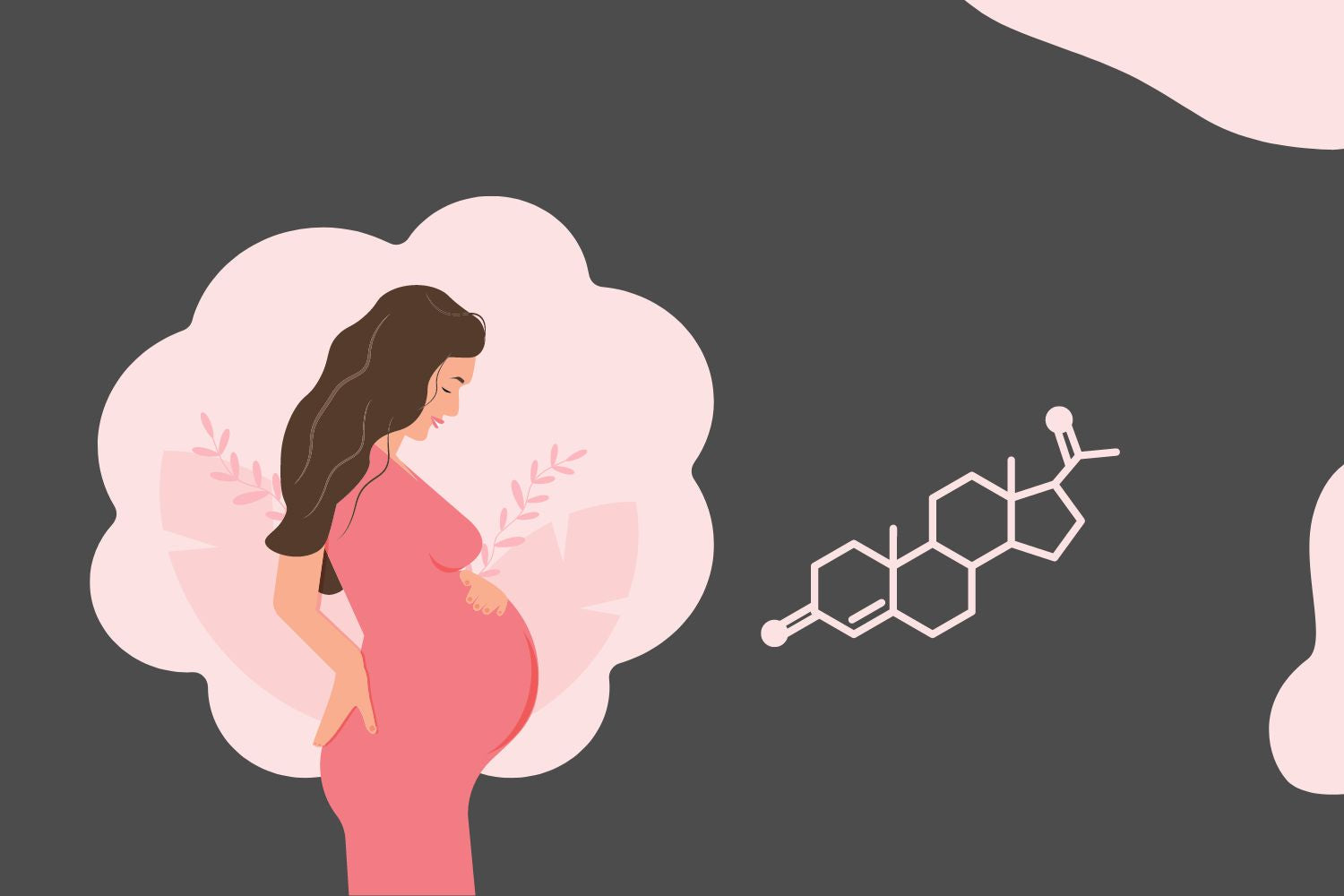Table of contents
Hormones play an essential role in conception and pregnancy. Progesterone, in particular, is vital to maintaining a healthy pregnancy. Recently, researchers have become interested in whether or not low levels of progesterone can negatively affect pregnancy. Doctors have difficulty determining which occurs first, low progesterone or pregnancy loss. Is low progesterone the cause of miscarriage or simply a side effect? Here is what you need to know about this often-debated topic.
What is Progesterone?
As you may have guessed by the name, progesterone, or pro-gestation, is essential for a developing embryo. When your ovarian follicle releases an egg during ovulation, an empty sac is left behind. The empty follicle sac seals itself off and becomes a mass of cells known as the corpus luteum. Its job is to produce progesterone during preconception and the early stages of your pregnancy.
Before the egg nestles into your uterus, the progesterone from your corpus luteum is working to prepare the uterine lining by thickening and maturing it. Progesterone will continue to be produced by the corpus luteum during and after conception. Around seven to nine weeks of pregnancy, the placenta will begin making high enough levels of progesterone on its own. At this time, production by the corpus luteum is no longer needed. But until this happens, your womb depends on adequate progesterone levels from the corpus luteum to keep the uterus lining healthy.
What Are Normal Progesterone Levels?
Progesterone levels increase throughout your pregnancy. Doctors generally agree that specific amounts are necessary to sustain a pregnancy. Here are the normal ranges for each trimester of pregnancy:
First trimester: 11.2 to 90 ng/ml (nanograms per milliliter)
Second trimester: 25.6 to 89.4 ng/ml
Third trimester: 48 to 300+ ng/ml
Usually, for a woman to be considered at low progesterone levels, the numbers would need to fall well below the average. In the first trimester, this is often around 5 ng/ml, though even 10 ng/ml may be too low. It used to be thought that low progesterone during early pregnancy was relatively uncommon. In fact, most doctors will not test your progesterone levels unless they suspect something is wrong. However, many women often wonder if low progesterone could be blamed for early pregnancy loss.
What Happens If My Progesterone Levels Drop?
Sometimes progesterone levels can drop in early pregnancy. This can occur even if you have had a positive pregnancy test. While it isn't always easy to identify the cause, these are some potential reasons why your progesterone levels may be low:
Chemical pregnancy
A chemical pregnancy is a very early form of miscarriage. It can happen before you take a test or very shortly after testing. Usually, chromosomal abnormalities are to blame. Because the fertilized egg often implants but does not grow, your progesterone levels may taper off when your period is supposed to start.
Ectopic pregnancy
Ectopic pregnancy is when a fertilized egg implants outside the uterus. Usually, it doesn't reach the uterine cavity and instead begins to grow in the fallopian tubes. An embryo cannot grow and develop outside your womb, causing progesterone levels to drop. However, most ectopic pregnancies will still result in a positive pregnancy test.
PCOS (polycystic ovarian syndrome)
Women with PCOS often have low progesterone levels in early pregnancy because they suffer from estrogen dominance. In some cases, this imbalance of hormones can cause early miscarriage.
How Will I Know If I Have Low Progesterone?

Blood testing is typically the gold standard for testing progesterone levels. However, urine tests measuring progesterone metabolite (PdG) are sometimes used.
It's not easy to accurately assess progesterone levels in the blood, though, because your body secretes the hormones in pulsations. This means that levels can fluctuate wildly even within an hour, rendering a single blood test inaccurate.
Urine samples can be more accurate because they measure progesterone after it has been circulated through your blood and metabolized. PdG testing is also less invasive and may be more comfortable.
However, there are signs you may notice that can indicate low progesterone. Women with low progesterone in early pregnancy may experience:
- Bleeding or spotting
- Cramping
It can be challenging to receive testing for progesterone levels, as most doctors are reticent to test until after you have had multiple miscarriages.
Does Low Progesterone Mean I Will Miscarry?
Some experts say that low progesterone leads to an inadequately prepared uterus, slimming the chances of a successful pregnancy. Alternatively, as many experts say, progesterone does not affect pregnancy success, and the root issue is something else; low progesterone is a side effect. Meaning the pregnancy wouldn't have continued regardless. Either way, it can be confusing, overwhelming, and scary for women to experience.
Unfortunately, studies are unclear. Women who suffer early miscarriage indeed tend to have lower levels of progesterone. But experts aren't sure that miscarriages can be attributed solely to these low levels.
What Can I Do To Increase Progesterone?
Just the thought that low progesterone can affect pregnancy is scary, leading many mothers-to-be with the desire to increase their progesterone levels.
Suppose your doctor believes low progesterone is causing pregnancy complications. In that case, they may decide to treat you with prescription medications or supplements. These can be taken orally or as vaginal suppositories. Injections have also been used to treat low progesterone. In most cases, these are the most effective ways to boost progesterone.
Dietary and lifestyle changes can also have a positive impact. Maintaining a healthy weight can help balance your hormones. Certain foods, such as Brussel sprouts, kale, and beans, may help support progesterone production.
Those who want to take a holistic approach may benefit from herbal supplements. Chasteberry, also known as Vitex, has been shown to support progesterone levels. However, it is not considered safe during pregnancy and should be discontinued very early on. Ayurveda also believes in seed cycling, the practice of eating specific seeds during certain phases of your menstrual cycle, as a way to balance your hormones.
Remember, before trying any natural supplements or holistic methods, you should consult your doctor.
What About Progesterone and Fertility?
Interestingly, if you suffer from low progesterone and are being treated by your doctor, the medication prescribed will need to be taken before conception. However, experts tend to agree that low progesterone doesn't affect fertility.
What is known is that low progesterone is often tied to a luteal phase deficiency. This occurs when the luteal phase, the phase after ovulation and before conception or your menstrual period, is too short. When this phase is shortened, adequate levels of progesterone are not achieved. However, it is thought that luteal phase deficiency is a byproduct of some other hormonal issue, such as endocrine dysfunction, and that when the root problem is treated, the luteal phase deficiency and low progesterone issues will resolve.
During IVF, progesterone is given due to induced low hormone levels. Hormone levels are carefully monitored during IVF, and doctors are aware that progesterone will be lacking in early pregnancy after transfer. Therefore, they regularly supplement a woman's levels with prescribed progesterone. Most often given by injection or suppository, supplemental progesterone is commonly continued for the first two to three months of pregnancy.
What Should A Mother-To-Be To Do?
Ayurveda believes in devoting a period of time, often three months, to preconception. One of the most significant benefits of this phase is working to balance the body's hormones. A healthy baby needs a healthy womb, and hormone levels can contribute to this. Fertility supplements, such as Osh Wellness Fertility Support, can be used even by couples who don't have issues getting pregnant. Time-honored ingredients backed by science work to support healthy hormone levels, nourishing the womb and preparing it for implantation and pregnancy.
Sometimes, making these lifestyle and dietary changes can be enough. Although, if you have suffered from recurrent miscarriages or believe you have low progesterone, you should always talk to your doctor. No one should have to deal with these worries alone, don't hesitate to reach out for support.








